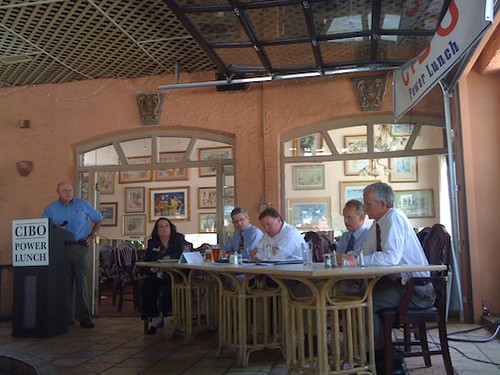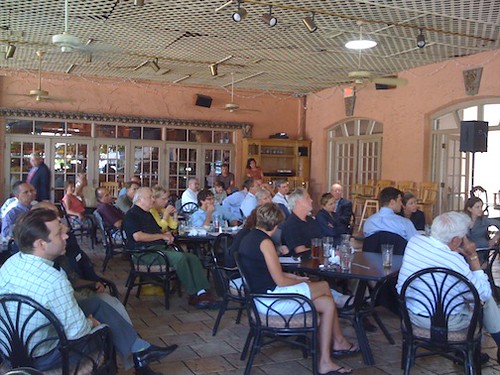About 50 local business owners gathered over grilled chicken yesterday for a discussion about property values and the state of Asheville’s economy. The monthly “Power Lunch Meeting” was sponsored by the Council of Independent Business Owners and featured a panel of city, county and business leaders, including County Tax Collector Gary Roberts, County Attorney Michael Frue, Asheville City Manager Gary Jackson and the owner of Spake Real Estate, John Spake.
Roberts led things off with an explanation of why the county chose not to reappraise property values this year. The last county-wide revaluation was done in 2006, before the recession, and many of the property owners in attendance seemed to think it’s high time their property values were reevaluated and tax rates were adjusted accordingly.
But in early 2009, Buncombe officials looked into the revaluation process and analyzed the area’s assessment ratio — how the assessed tax values compare to market values. The ratio came in at 93 percent, Roberts explained. Under state law, the county only has to reassess every eight years, or when the assessment ratio goes above 115 percent or below 85 percent, he added.
The goal is to “have taxation that’s fair for citizens,” he said. “There are properties that are overassessed. Many of them are commercial. Many of them are high-end homes. But when you look at where a lot of the sales have been … there’s a lot of properties that are undervalued.”
Perhaps sensing that some in the crowd weren’t buying it, Roberts went on to encourage anyone who thinks their property is overvalued to give his office a call and request an appeal.
“We want to tax you fairly. We don’t want to over tax you,” he said.
The state of real estate
Later in the meeting, Spake reported that his local commercial real estate business has seen inquiries drop 30 percent on improved properties since 2007-2008, and 90 percent on undeveloped land. “Land sales are very slow. This is the toughest segment of the market,” he explained.
But Spake also said he saw signs of hope on the horizon, citing “a lot of good activity downtown lately.”
As examples, he said his firm recently sold the Asheville Area Arts Council property at 11 Biltmore Avenue, which garnered five offers in a matter of only two months. And they’ve received 75 calls in the last 90 days from people interested in leasing property on Lexington Avenue adjacent to Tops Shoes, he said.
“The fact is, the Asheville brand is very desirable still, especially for downtown,” he asserted.
Doing “less with less”
Jackson started his section of the discussion by appealing for sympathy.
“We’ve been weathering the storm with you,” he said of the city’s finances. “Just as there are many people in this room concerned about how they’re going to make payroll this week, we are as well.”
A couple of years ago, the city was “doing more with less,” he said. But “now, we’re doing less with less.”
Jackson went on to cite numerous measures the city has taken to cut costs, including hiring and salary freezes, cutting back on recreation center hours and brush collection schedules.
But like Spake, Jackson said he sees signs that things are turning around.
While acknowledging that rates are down from what they were a few years ago, he pointed at rising hotel occupancy rates as a step in the right direction. Similarly, he noted that building permits are up, although they’re for “smaller square footage and smaller lots” than what they were in 2006-2007.
Jackson went on to cite several examples of public-investment projects he thinks will help get the local economy back on track, such as establishing the UNC Eshelman School of Pharmacy at UNCA, as well as bringing back to town the Southern Conference Basketball Tournament and making associated improvements to the Asheville Civic Center.
“That tournament is going to put people on the street [with] high-dollar, high-disposable income,” he explained. “And that investment will also attract more shows, and more people to the Civic Center and to businesses downtown.”






Before you comment
The comments section is here to provide a platform for civil dialogue on the issues we face together as a local community. Xpress is committed to offering this platform for all voices, but when the tone of the discussion gets nasty or strays off topic, we believe many people choose not to participate. Xpress editors are determined to moderate comments to ensure a constructive interchange is maintained. All comments judged not to be in keeping with the spirit of civil discourse will be removed and repeat violators will be banned. See here for our terms of service. Thank you for being part of this effort to promote respectful discussion.